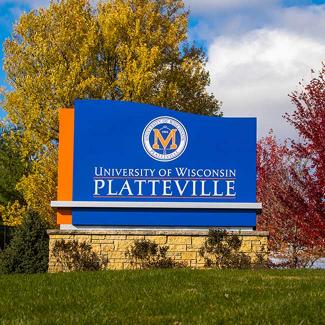What You'll Learn in the Applied Biotechnology Program
Whether your experience is in healthcare, agriculture, or manufacturing, you can earn your Master of Science in Applied Biotechnology online and advance your career. You’ll acquire a foundation in the principles and techniques of biotechnology and choose one or more specialization tracks to match your career goals.
- Business management: Explore marketing fundamentals and commercialization strategies for diverse areas of biotechnology, including pharmaceutical marketing, B2B marketing, and examine the importance of supply chain relevant to a variety of processes specific to biotechnology.
- Quality assurance and compliance: Learn to ensure quality standards are met, from discovery to production. Examine key regulatory agencies and practices within the highly-regulated and diverse biotechnology industry. Examine case studies of biotech industries, product design and clinical trials, and methods to ensure consumer and environmental protection.
- Research and development: Explore strategies in evaluating and implementing new products within diverse areas of biotechnology including agriculture, industrial, medical, and environmental. Learn to evaluate scientific discovery and market value, navigate patent, intellectual property, and licensing requirements, and balance business growth with innovation.
You’ll have the opportunity to complete a project for an actual workplace or professional setting and apply what you’ve learned to real-world problems. With an advanced degree in applied biotechnology, you can be part of the exciting growth in the biotechnology field.
Earn your degree at your pace with flexible courses that fit your schedule. The total cost of the program is $26,350*.
*Subject to change without notice.
Careers in Applied Biotechnology
Biotechnology is a dynamic field with diverse applications across sectors. This diversity creates a broad range of careers in the field with varying job titles and responsibilities. Earning a master's degree or certificate in applied biotechnology will prepare you for a range of exciting potential careers, including:
- Biomedical examiner
- Biological technician
- Marketing or business development manager
- Microbiologist
- Quality assurance manager
- Regulatory affairs manager
- Research and development manager
- Research scientist

"I wanted to expand my knowledge of the technologies used in biotechnology. The program made the most sense to me because I can continue to work full-time and finish my degree at a reasonable pace. The flexible schedule that the online program allows has been vital in maintaining a balance between work, school, and home life."
Ashley Pratt
M.S. in applied biotechnology
Graduate Certificate
A graduate certificate is a credential that equips you with foundational knowledge and skills in a particular field. Although it doesn't replace a master's degree, it proves competence in an area and bolsters your resume.
Credit for Prior Learning
Has previous life experience already helped you build knowledge and skills applicable to your studies? If so, we want to recognize that – and help you save time and money in the process. Speak with an admission counselor to see if your previous experience qualifies.
-
Requirements may be subject to change without notice
Start Dates and Timelines
To ensure you are admitted for the semester you intend to start on your degree, you'll want to submit your application and supporting materials by:
- Spring: January 15
- Summer: May 15
- Fall: August 15
Academic Calendar
Find important University of Wisconsin-Platteville dates such as the beginning and end of each semester, breaks in the semester, final exams, and deadlines for dropping or adding classes using our academic calendar. Spring and fall semesters are each 16 weeks, while the summer semester is 12 weeks.
Transfer Information
UW-Platteville allows for students to transfer up to 12 credits of previously taken graduate coursework. Credits need to have been earned from a nationally or regionally accredited institution recognized by the Council for Higher Education Accreditation and approved by UW-Platteville program faculty.
-
- How an Applied Biotechnology Student Is Turning Learning into Real-World Innovation Published: Dec 22, 2025
- Networking Tips for Applied Biotechnology Students Published: Oct 02, 2025
- Meeting Students Where They Are: Applied Bioinformatics Instructor Helps Others Access New Career Opportunities Published: Dec 10, 2024
- Healthcare Positions Abound in U.S. News’ List of Top Jobs Published: Sep 24, 2024
- Faculty Member’s Passion for Natural Science Extends Into Online Master’s Degree Programs Published: Mar 13, 2024
- Online Degree and Certificate Programs for the Next Generation of Women In STEM Published: Mar 08, 2024
- ‘Dress For STEM’ Celebrates Women in STEM and Brings Awareness to Gender Gap Published: Mar 01, 2024
- First-Generation College Graduate Finds Community and Fulfillment in Applied Biotechnology Program Published: Jan 05, 2024
- Setting the Stage for a Healthcare Career Published: Sep 28, 2023
- ‘It’s Never Too Late’: UW Graduate Student With Music Background Shares Experience in Applied Biotechnology Program Published: Jul 31, 2023
- UW Applied Biotechnology Faculty Shares Tips On How to Make the Most of Your Capstone Project Published: Mar 09, 2023
- Meet the Faculty of the UW Master’s in Applied Biotechnology Published: Aug 11, 2022

UW Online Collaboratives
Because our program is offered in coordination with UW Online Collaboratives, you'll learn from professors across the state who have a wide range of expertise. Visit their website to learn more about the program.







